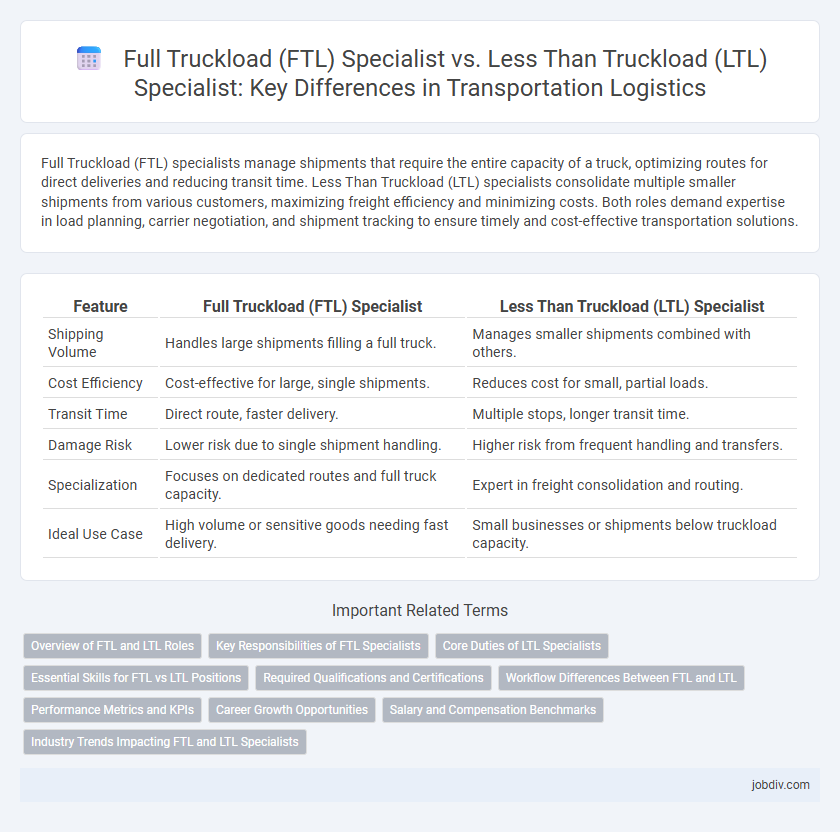Full Truckload (FTL) specialists manage shipments that require the entire capacity of a truck, optimizing routes for direct deliveries and reducing transit time. Less Than Truckload (LTL) specialists consolidate multiple smaller shipments from various customers, maximizing freight efficiency and minimizing costs. Both roles demand expertise in load planning, carrier negotiation, and shipment tracking to ensure timely and cost-effective transportation solutions.
Table of Comparison
| Feature | Full Truckload (FTL) Specialist | Less Than Truckload (LTL) Specialist |
|---|---|---|
| Shipping Volume | Handles large shipments filling a full truck. | Manages smaller shipments combined with others. |
| Cost Efficiency | Cost-effective for large, single shipments. | Reduces cost for small, partial loads. |
| Transit Time | Direct route, faster delivery. | Multiple stops, longer transit time. |
| Damage Risk | Lower risk due to single shipment handling. | Higher risk from frequent handling and transfers. |
| Specialization | Focuses on dedicated routes and full truck capacity. | Expert in freight consolidation and routing. |
| Ideal Use Case | High volume or sensitive goods needing fast delivery. | Small businesses or shipments below truckload capacity. |
Overview of FTL and LTL Roles
Full Truckload (FTL) Specialists manage shipments that fill an entire truck, ensuring efficient utilization of space and direct transportation from origin to destination without intermediate stops. Less Than Truckload (LTL) Specialists coordinate smaller shipments from multiple customers, consolidating loads to optimize cost and delivery schedules across various routes. Both roles require expertise in route planning, cargo safety, and carrier management to meet specific logistical demands within supply chain operations.
Key Responsibilities of FTL Specialists
FTL Specialists manage end-to-end full truckload shipments, ensuring optimal route planning and load consolidation to maximize efficiency and reduce transit times. Their key responsibilities include coordinating with carriers and drivers for timely pickups and deliveries, monitoring freight status, and maintaining compliance with safety and regulatory standards. They also analyze shipment data to optimize truck utilization and cost-effectiveness while providing real-time updates to clients.
Core Duties of LTL Specialists
LTL specialists coordinate shipments that involve multiple customers sharing trailer space, optimizing route planning and load consolidation to minimize shipping costs and transit time. They manage detailed shipment documentation, freight classification, and carrier negotiations to ensure compliance with industry regulations and timely deliveries. LTL experts also monitor tracking systems and handle claims processing to maintain customer satisfaction and operational efficiency.
Essential Skills for FTL vs LTL Positions
FTL specialists require expertise in route optimization, load planning for entire truck capacity, and time-sensitive delivery coordination to maximize efficiency and cost-effectiveness. LTL specialists focus on consolidating multiple smaller shipments, managing complex freight documentation, and coordinating pickup and delivery schedules to ensure precise inventory tracking and customer satisfaction. Both roles demand strong communication skills, but LTL positions emphasize multitasking and detailed freight auditing due to diverse shipment handling.
Required Qualifications and Certifications
Full Truckload (FTL) specialists typically require expertise in route optimization, freight handling, and logistics software, with certifications such as Certified Transportation Professional (CTP) or logistics-related credentials enhancing their qualifications. Less Than Truckload (LTL) specialists must possess skills in cargo consolidation, shipment tracking, and customer service, often holding certifications like the Certified in Transportation and Logistics (CTL) or specialized supply chain management credentials. Both roles benefit from knowledge of industry regulations, safety standards, and proficiency in transportation management systems (TMS) to ensure efficient and compliant freight operations.
Workflow Differences Between FTL and LTL
Full Truckload (FTL) specialists coordinate end-to-end shipments that require an entire truck's capacity, streamlining direct routes from origin to destination with minimal handling. Less Than Truckload (LTL) specialists manage multiple smaller shipments by consolidating freight from various clients, optimizing space utilization through complex routing and scheduling processes. The workflow difference lies in FTL's straightforward logistics versus LTL's intricate load planning and freight hub coordination.
Performance Metrics and KPIs
Full Truckload (FTL) specialists focus on metrics such as on-time delivery rate, load utilization percentage, and transit time consistency to maximize efficiency in handling single-shipment loads. Less Than Truckload (LTL) specialists prioritize key performance indicators like freight cost per hundredweight, dock-to-dock transit times, and claims ratio to optimize multiple smaller shipments consolidated in one trailer. Both roles rely heavily on driver performance scores and customer satisfaction indexes to ensure high service quality and operational reliability.
Career Growth Opportunities
Full Truckload (FTL) Specialists often experience rapid career growth by managing end-to-end logistics for large-scale shipments, enhancing leadership and operational expertise. Less Than Truckload (LTL) Specialists gain valuable skills in optimizing multi-client freight consolidation, developing expertise in cost efficiency and customer service. Both career paths offer advancement opportunities, with FTL roles leaning towards fleet management and LTL roles focusing on network optimization and freight brokerage.
Salary and Compensation Benchmarks
Full Truckload (FTL) Specialists typically command higher salaries due to the complexity and scale of managing entire truck shipments, with average compensation ranging from $60,000 to $80,000 annually. Less Than Truckload (LTL) Specialists earn between $50,000 and $70,000, reflecting the intricacies of consolidating shipments from multiple clients into one truck, which requires precise coordination and efficiency. Both roles offer performance bonuses and benefits, but FTL Specialists often see greater variable pay linked to shipment volume and distance.
Industry Trends Impacting FTL and LTL Specialists
Full Truckload (FTL) specialists are experiencing increased demand driven by e-commerce growth and the need for faster, dedicated shipments, pushing advances in real-time tracking and fuel efficiency technologies. Less Than Truckload (LTL) specialists face pressure to optimize consolidation strategies and reduce carbon emissions amid tighter environmental regulations and fluctuating fuel prices. Both sectors are adapting to digital freight platforms and AI-driven route optimization to enhance operational efficiency and meet evolving customer expectations.
Full Truckload (FTL) Specialist vs Less Than Truckload (LTL) Specialist Infographic

 jobdiv.com
jobdiv.com